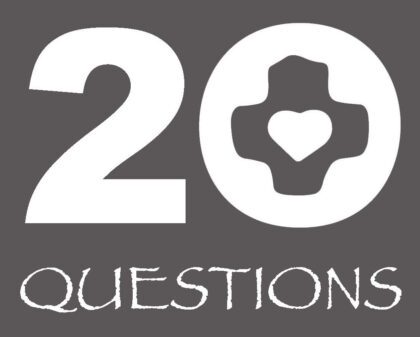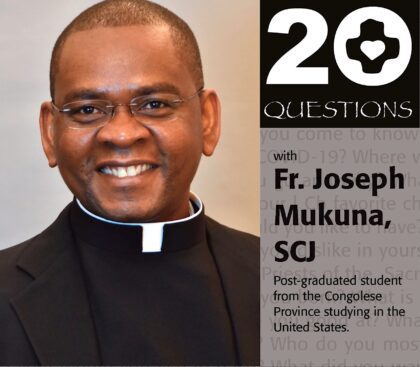 Favorite color? What makes you happy? What are you good at? What is your greatest fear… “Twenty Questions” is a regular feature in which SCJs and those with whom they minister and collaborate share a bit about themselves in an informal Q&A. Participants are given the same list of questions and are invited to answer as many as they would like.
Favorite color? What makes you happy? What are you good at? What is your greatest fear… “Twenty Questions” is a regular feature in which SCJs and those with whom they minister and collaborate share a bit about themselves in an informal Q&A. Participants are given the same list of questions and are invited to answer as many as they would like.
Fr. Joseph Mukuna, SCJ, is a member of the Congolese Province doing post-graduate studies in the United States.
Q: Where were you born and raised? Describe your family.
FR. JOSEPH: My name is Joseph Mukuna. I was born and raised in Kananga (Congo). I have two brothers and two sisters; I am second in the line. My elder sister is married and has three children. My two younger brothers are also married and live in Congo. Our parents are deceased.
Q: What is your favorite book or movie?
FR. JOSEPH: My favorite movie is Romero. I was introduced to this movie when I was in the minor seminary. I was touched by Romero’s peaceful struggle against injustice and his courage to stand for justice and truth in the middle of danger.
Q: If you could travel anywhere in the world post-pandemic – without concern about the expense – where would you go and why?
FR. JOSEPH: After the pandemic, my choice would be to visit the Holy Land because I want to relate what I have been studying in the New Testament and about Early Christianity with the land where those things occurred. This would give me much strength and knowledge about the Bible and the land it comes from.
Q: What are you good at?
FR. JOSEPH: This is a tricky question and not easy to answer. Well, I am good at liking what I do. Many people have told me that I am good at speaking to groups and convincing people (teaching and preaching). I have also learned that I like organizing things, prioritizing time, and listening and giving advice to people. I discovered this during my experience as a local superior and as a pastor. I also like to keep learning. But sometimes, I struggle to know what I am really good at. Yet I discover that I easily adapt and adjust in the midst of change.
Q: What is your favorite color?
FR. JOSEPH: I have actually two favorite colors. White is the color of my childhood. When I was a child my mum used to dress me in white and so I have come to love and appreciate this color. As for why, I am not quite sure. Perhaps because it is remarkable and it can go literally with everything. Now as an adult, I am attracted to blue. I like blue in its nuances because it makes me feel well and puts my mind at peace.
Q: Do you have any hobbies or pastimes? If so, what are they and how did you get interested in them?
FR. JOSEPH: I like watching and playing soccer. But I sometimes prefer playing guitar and listening to music. I was introduced to guitar when I was in the minor seminary. I had a possibility to learn how to play piano and guitar and I did both. Without practicing piano, I have lost much. Still, I have time to play guitar during my leisure time. Another thing I like doing is writing and reciting poetry.
Q: What is your favorite food?
FR. JOSEPH: I like trying new food and meeting new people. When given the opportunity I like eating food from home: fufu and goat sauce! Still I am open to food from other cultures.
Q: What is your least favorite chore?
FR. JOSEPH: Folding clothing! I guess I got used to having somebody take care of my laundry for so many years. Occasionally, I do fold, but I prefer to use the hangers and wait for the time to iron what I need to use.
Q: Who — living or deceased — do you most admire and why?
FR. JOSEPH: I much admire my deceased dad. He was very optimistic and always ready to help others. I do remember that we had a lot of guests visiting him and staying in our house. Sometimes, we had the impression that he was dedicating more time to serving guests than being with his own family. We later learned that his positive attitude influenced many people.
Q: What skill or talent would you like to have that you do not? Why?
FR. JOSEPH: I would like to improve my computer skills.
Q: As a child, what did you want to be when you grew up?
FR. JOSEPH: When I was a kid, my big dream was to become a medical doctor because my auntie, who is a religious in the Congregation of the Sisters of the Charity of Jesus and Mary (Belgium), is a medical doctor. I was impressed by the work she was doing with the poor and sick people in my region.
Q: What makes you happy?
FR. JOSEPH: Another challenging question! However, I would start by saying that I have learned over the years to find happiness in the small things that I do every day and that bring peace of heart. Some of those things are: watching comedies that can make me laugh and smile, being with people and serving them, getting enough rest and having time for myself and for prayer and meditation, spending time with family (community) and friends, saying thank you to people to show them that I am appreciate their support, liking what I do and accomplishing my task. In short, anything that brings joy, peace of mind and a sense of well-being me makes me happy.
Q: What is your greatest fear?
FR. JOSEPH: There are actually many of them but right now I fear that I am not doing what makes me happy and I am not making an effective and valuable contribution to church and society.
Q: What trait or habit do you dislike in yourself?
FR. JOSEPH: Sometimes, it is very hard to answer this kind of question; it is an exercise in introspection. I easily get angry when forced to do what I don’t want to do. However, I don’t keep my anger for a long time.
Q: What trait or habit do you dislike in others?
FR. JOSEPH: While I do understand and respect the diversity of personalities, it is difficult for me to work with aggressive and loud people. I don’t like improvisation, I like preparation.
Q: List three words that describe you.
FR. JOSEPH: Wow! Describing myself with three words? Based on my current experience as a student, I would describe myself as patient, optimistic, and a hard worker.
Q: How did you come to know of the Priests of the Sacred Heart (Dehonians) and what interested you about them?
FR. JOSEPH: A priest of the Sacred Heart (Dehonians) invited me to visit our community in Lemba and from there I started my journey with the SCJs. What I liked was adoration, hospitality, community life and dedication to youth education and the marginalized (street children, prisoners).
Q: Do you consider yourself a Dehonian? If so, what does that mean to you?
FR. JOSEPH: I joined the SCJs when I was turning 19. When I look back, I can honestly say that I grew up with the Priests of the Sacred Heart (Dehonians). I was educated (and continue to be) and guided by this family. On August 12, 2020, I will be 21 years in vows with the Dehonians. I always consider the Dehonians as my second family. I have now brothers and friends from all over the world thanks to the Priests of the Sacred. So, I am not ashamed to say that I am a Dehonian; I am proud to be part of this wonderful family to which I am very grateful.
To be a Dehonian for me is to struggle to live the “Dehonian dream” which is to be a “prophet of love and servant of reconciliation”. This is a kind of everyday call and challenge. It is also the sense that I give to my training in New Testament studies, to become more aware of the love of God for humanity made manifest in the open heart of Jesus, and to learn how to talk about this love. Being a Dehonian today is to make relevant the “Dehonian dream” in our world in bringing joy and hope to people, and to work for peace and reconciliation.
Q: What changes, adaptations or insights do you expect to stay with you from the pandemic? In other words, how do you expect to be changed by COVID-19?
FR. JOSEPH: COVID-19 has given me time to reflect on my goals and plans for the future. During this pandemic, I have been exposed to so many challenging and exciting ideas and opportunities that have pushed me outside of my comfort zone and challenged my worldview. For instance, I have heard many comments about how the pandemic will change the way we live and think. Some have gone even so far as predicting that COVID-19 might affect human beings as a species. All of these comments and the concept of “change” in a post-COVID-19 world evoked by many has led me to think, if there will be change, how will I personally experience it? What is certain is that I will always remember COVID-19. I expect some things will not go back to the way they were before. For example, the way I used to pray, think and work. COVID-19 has rapidly affected the basic way I think about God, talk about Him (preaching and teaching, and through prayer). I have slowly moved from the question: “Why did God allow this pandemic?” to “What can I do now to help people who are directly affected by the pandemic?” Trying to find answers to this fundamental question has helped me to deal with both stress and anxiety.
Another remarkable thing about this pandemic is that it forces me to adapt and adjust. As a way of illustration: social distancing has forced me to adapt to online learning tools though sometimes using new information technology is not my cup of tea. I realized today that I am experiencing educational methods that I never seen before and I am getting more accustomed to them. A big challenge is to make use of online tools.
To sum up, COVID-19 is shaking us up and showing us that we depend on something bigger than what we may think. This pandemic has confirmed that our “social reality” is fake. We can live and be happy without some of the things that we used to call important and value.

